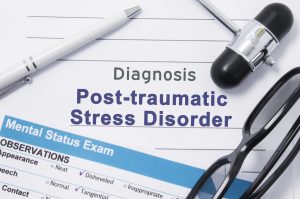 Workplace PTSD in North Carolina
Workplace PTSD in North Carolina
A lot of NC workers comp claims focus on physical injury, but there are times when mental health becomes an issue. In fact, it can be one of the more complex types of workplace injury, particularly because not a lot is known about the condition in the general public and sometimes people don’t recognize they may be suffering from PTSD.
There were over 2 million cases of workplace injury and illness in 2016. Balance that with $193 billion in lost earnings annually because of mental illness, and the price tag is steep.
Let’s break down what work-related PTSD is, how it relates to North Carolina workers comp claims, and how to get started on your claim.
What Is Workplace Post Traumatic Stress Disorder?
First, the basics: what is workplace PTSD?
Post-traumatic stress disorder, or PTSD, is a disorder that develops in some people after a frightening, shocking, or otherwise traumatic experience.
It’s perfectly normal to be afraid or on edge after a traumatic situation. However, not everyone who experiences trauma develops PTSD or even short-term PTSD. Not everyone who works in a high-stress job develops PTSD either.
However, PTSD does happen, and just like the event that traumatized you isn’t your fault, PTSD normally is not related to fault.
PTSD Symptoms
PTSD looks different from person to person, though there are some common features between cases.
To receive a PTSD diagnosis, a doctor, psychologist or psychiatrist will be looking for the following:
- At least one re-experiencing symptom
- At least one avoidant symptom
- At least two cognition or mood symptoms
- At least two arousal and reactivity symptoms
Re-experiencing symptoms can include things like:
- Frightening thoughts
- Flashbacks
- Bad dreams
Avoidance symptoms include:
- Staying away from events, places or people that remind you of the event
- Avoiding thoughts or feelings connected to the event
Cognition or mood symptoms include:
- Feelings of guilt or blame
- Loss of interest in activities
- Negative thoughts about the world or yourself
Arousal and reactivity symptoms include:
- Feeling tense or on edge
- Difficulty sleeping
- Outbursts of anger or irritation
- Being startled easily
Having some of these symptoms immediately after a dangerous event is normal, and they often go away after a period of time. To be diagnosed with PTSD, you need to show the symptoms listed for at least one month after the traumatic event.
Types of Jobs where PTSD Claims are Likely
While dangerous events or accidents can happen in any job, there are some jobs which innately involve more risk, and are thus more likely to see workplace PTSD claims.
A typical example is firefighters, police officers, and military personnel, but it can also include jobs like nurses, doctors, paramedics, and other emergency personnel or first responders.
Workplace PTSD and Workers Comp
How does PTSD relate to workers comp? Is Mental Illness Is Covered? Can you make a claim under the NC Workers’ Compensation laws for PTSD?
Mental illness is covered under workers comp, but there’s a reason that more workers comp cases talk about physical injuries and illnesses than mental ones.
Workers comp does cover mental illness claims. However, we mentioned that some jobs are more likely to see mental illness-related workers comp claims for a reason. Jobs like those have the easiest time proving that the mental illness claims are directly connected to the workplace.
Proving Your Claim
Unlike a back injury, a broken arm, or carpal tunnel syndrome, PTSD doesn’t have physical symptoms that appear immediately after the incident. Because of this, it’s innately harder to connect the event with your mental illness.
That’s why you need to be thorough about collecting evidence for your claim.
First Steps
Before you make a workers comp claim, you need to make sure you follow the right steps.
Before doing anything else, you should visit a doctor. This is for a few reasons.
First, you need to address any injuries as soon as possible after the work incident. Second, if you put off going to see a doctor and then make a workers comp claim based on that incident, the time elapsed between when you were hurt and when you received medical treatment will hurt your case.
The doctor is also your starting point for collecting evidence to build your case, as they can give you a detailed breakdown of what’s going on in official terms. Keep in mind, though, that if you’re seeing a doctor paid for by your employer, they’re more likely to minimize than an independent doctor.
Whether you can see your own doctor or one paid for by your employer depends on your employer’s workers comp insurance. Make sure to ask before you go in.
Collecting Evidence
Once you visit the doctor, you need to get busy collecting evidence.
This includes official diagnoses, any paperwork your doctor has you fill out, etc. Ask your doctor to make copies of everything, they’ll usually be happy to oblige.
You should also keep a record of your appointments and the progression of your PTSD after the work incident. A journal and a calendar designated for this purpose work great. The journal will be used to track your symptoms and experiences day to day, and the calendar will be used to track your appointments with your doctor.
Talk to Your Attorney
Once you’ve gathered all the evidence you can, get in touch with your attorney. All of the evidence you collected should end up in front of them.
You should call your attorney as soon as possible — preferably before you talk to your insurance. Your attorney’s role is to help you make sense of the process and represent you in a way that will strengthen your claim, so let them do the talking for you.
And remember: be as open and honest with your attorney as you can. They can’t defend you without a full picture of the circumstances.
Find the Workers Comp Attorney for You
When you’re stuck in a scary situation after a workplace incident, you need someone who can help you make sense of the legal process. That’s what we’re here for.
Check out our blog for tips on where to get started, like our post on essential tips for hiring a Workmens Compensation Lawyer.
But if you need an in-person North Carolina Board Certified Workers’ Compensation Lawyer, we can help with that too. Get in touch for a free case evaluation today.
 North Carolina Workers' Compensation News
North Carolina Workers' Compensation News









